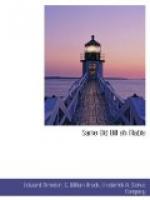Lykly he was, manlik of contenance,
Lik to the Scottis be mekill governance
Saiff off his tong, for Inglis
had he nane.
Later still, Dunbar, near the conclusion of his Golden Targe, apostrophises Chaucer as being “in oure Tong ane flouir imperiall,” and says that he was “of oure Inglisch all the lycht.” It was not till 1513 that Gawain Douglas, in the Prologue to the first book of his translation of Virgil, claimed to have “writtin in the langage of Scottis natioun”; though Sir David Lyndesay, writing twenty-two years later, still gives the name of the “Inglisch toung” to the vulgar tongue of Scotland, in his Satyre of the three Estaitis.
We should particularly notice Dr Murray’s statement, in his essay on The Dialect of the Southern Counties of Scotland, at p. 29, that “Barbour at Aberdeen, and Richard Rolle de Hampole near Doncaster, wrote for their several countrymen in the same identical dialect.” The division between the English of the Scottish Lowlands and the English of Yorkshire was purely political, having no reference to race or speech, but solely to locality; and yet, as Dr Murray remarks, the struggle for supremacy “made every one either an Englishman or a Scotchman, and made English and Scotch names of division and bitter enmity.” So strong, indeed, was the division thus created that it has continued to the present day; and it would be very difficult even now to convince a native of the Scottish Lowlands—unless he is a philologist—that he is likely to be of Anglian descent, and to have a better title to be called an “Englishman” than a native of Hampshire or Devon, who, after all, may be only a Saxon. And of course it is easy enough to show how widely the old “Northern” dialect varies from the difficult Southern English found in the Kentish Ayenbite of Inwyt, or even from the Midland of Chaucer’s poems.
To quote from Dr Murray once more (p. 41):




